Abstract
1. A group of normal and congenitally goitrous Merino sheep were investigated to identify the metabolic defect present in the abnormal animals. 2. Protein-bound iodine concentrations of serum from goitrous animals (average 5·7μg./100ml.) were higher than normal (average 4·2μg./100ml.; P 0·001), but the hormonal iodine measured as butanol-extractable 131I was low in the serum of goitrous (average 40·3% of protein-bound 131I) compared with that of normal (84·2%; P 0·02) sheep. The non-hormonal iodine of the serum of goitrous sheep appeared to include iodotyrosines and iodinated protein. 3. Starch-gel-electrophoretic separations of sera from normal and goitrous sheep after 131I injection (100–500μc) showed no qualitative differences in the radioactivity of protein components. No significant differences in thyroxine-binding in vitro by serum proteins of normal and goitrous sheep were observed. 4. The clearance rates of 131I-labelled iodotyrosines (t½ 1·2–2·9hr.) and iodothyronines (t½ 33·5–47·4hr.) were similar in normal and goitrous sheep. 5. The concentration of circulating thyroid-stimulating hormone was significantly higher (P<0·01 in three sheep, P<0·05 in one sheep) in goitrous sheep. 6. The congenital goitre appears to be due to compensatory hypertrophy of the gland resulting from an inability to synthesize an adequate supply of thyroid hormone.
Full text
PDF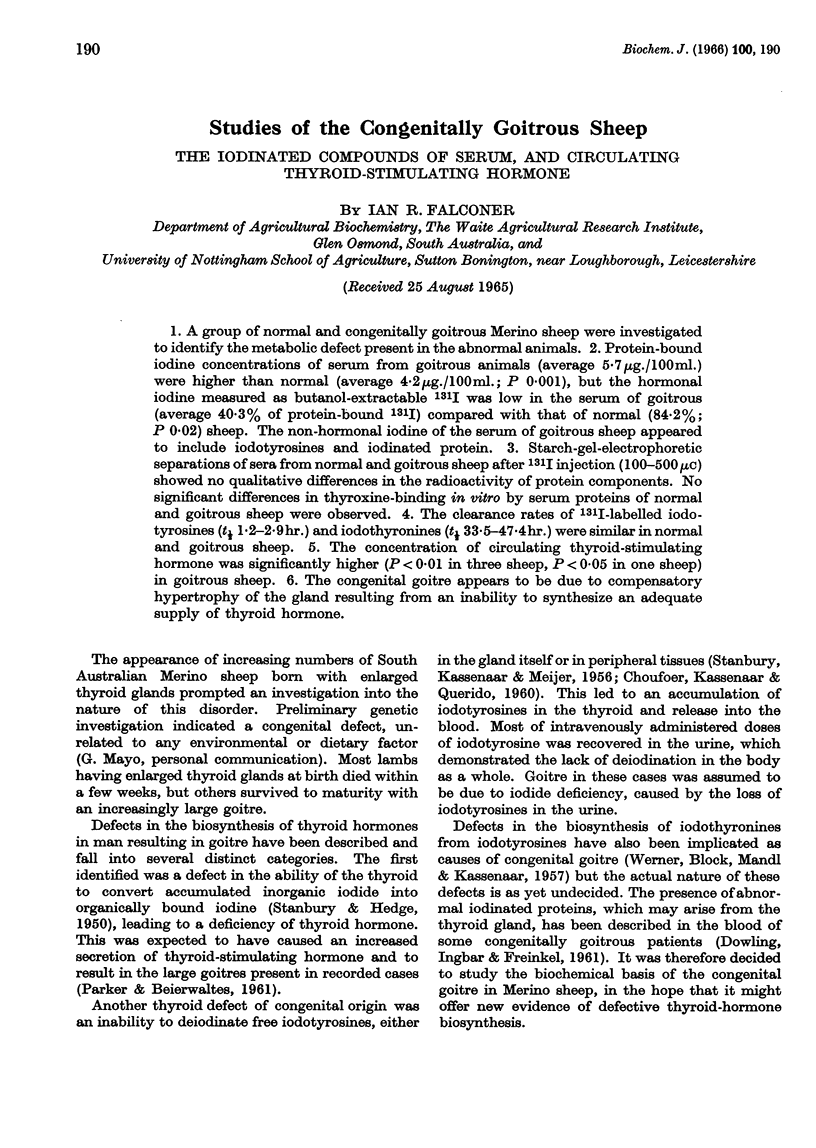
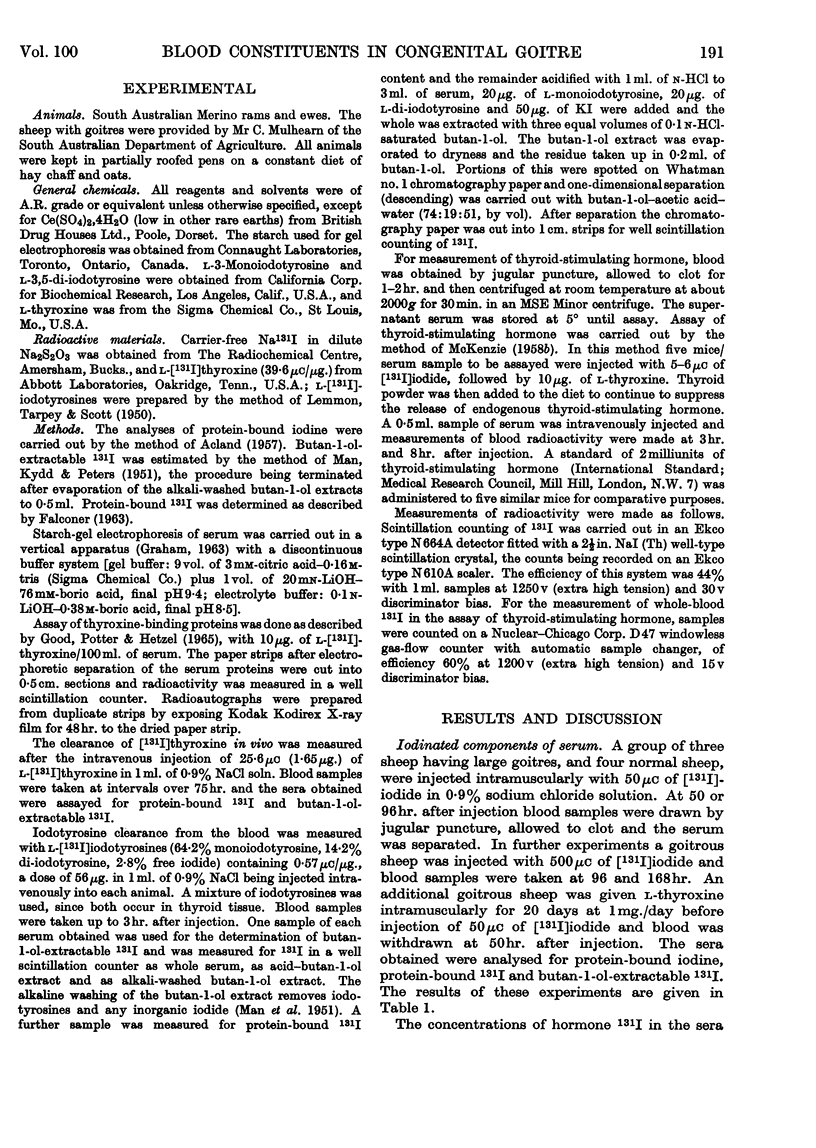
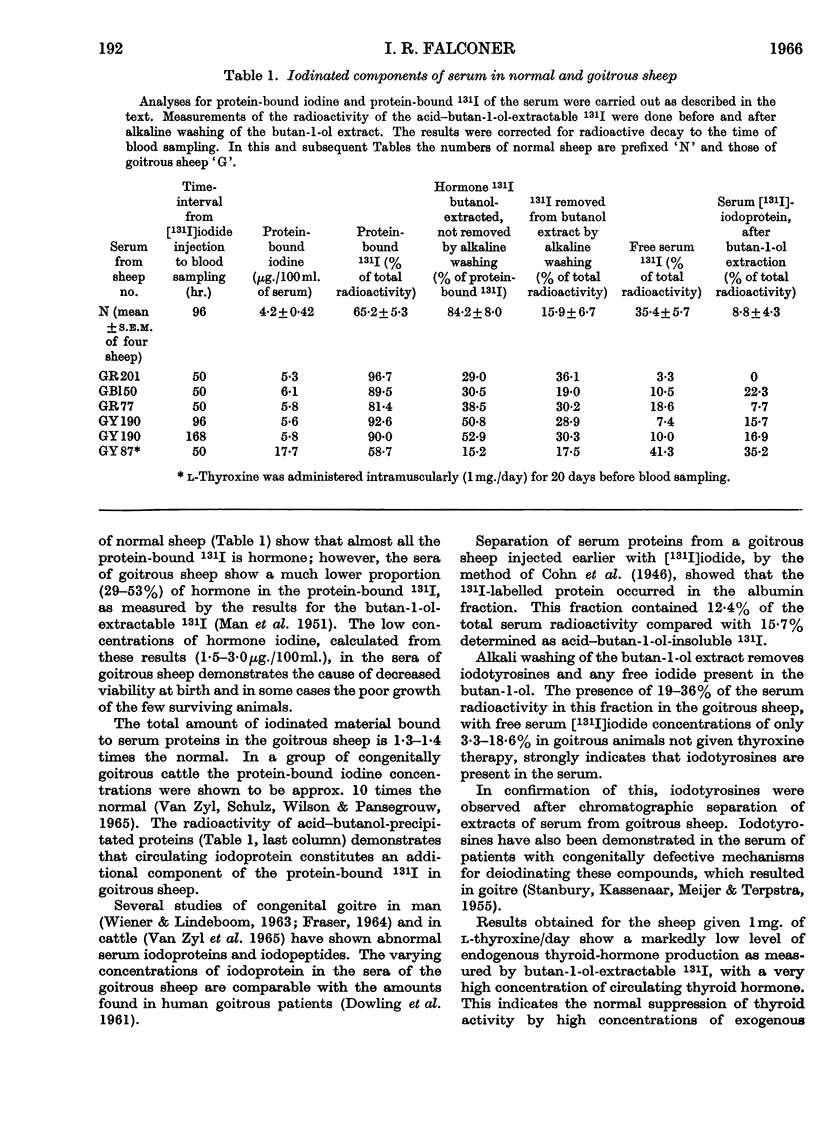
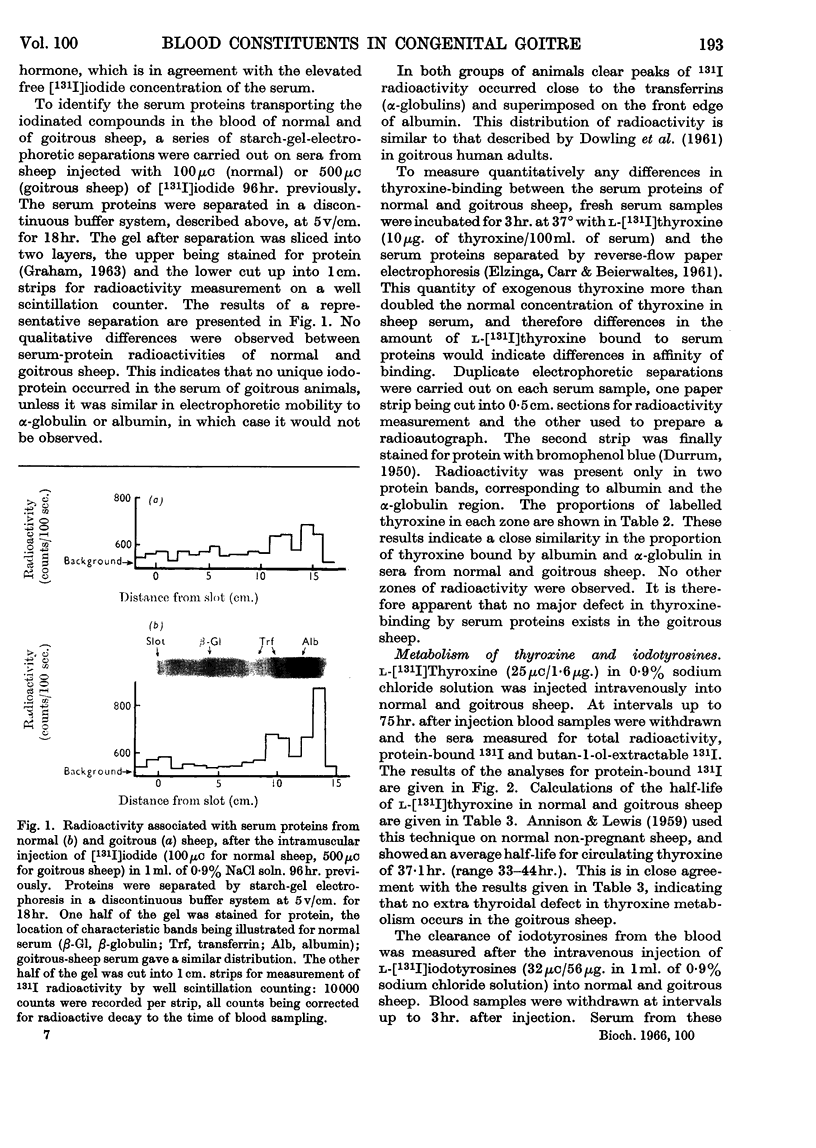
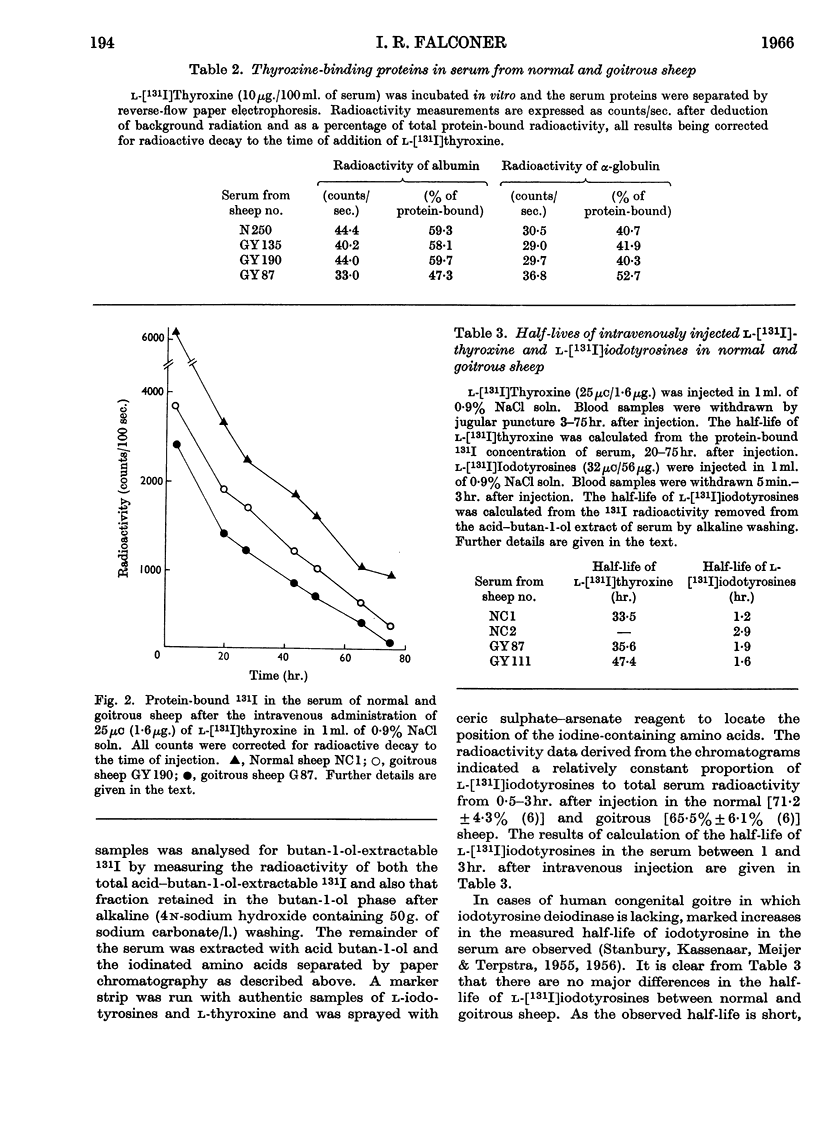
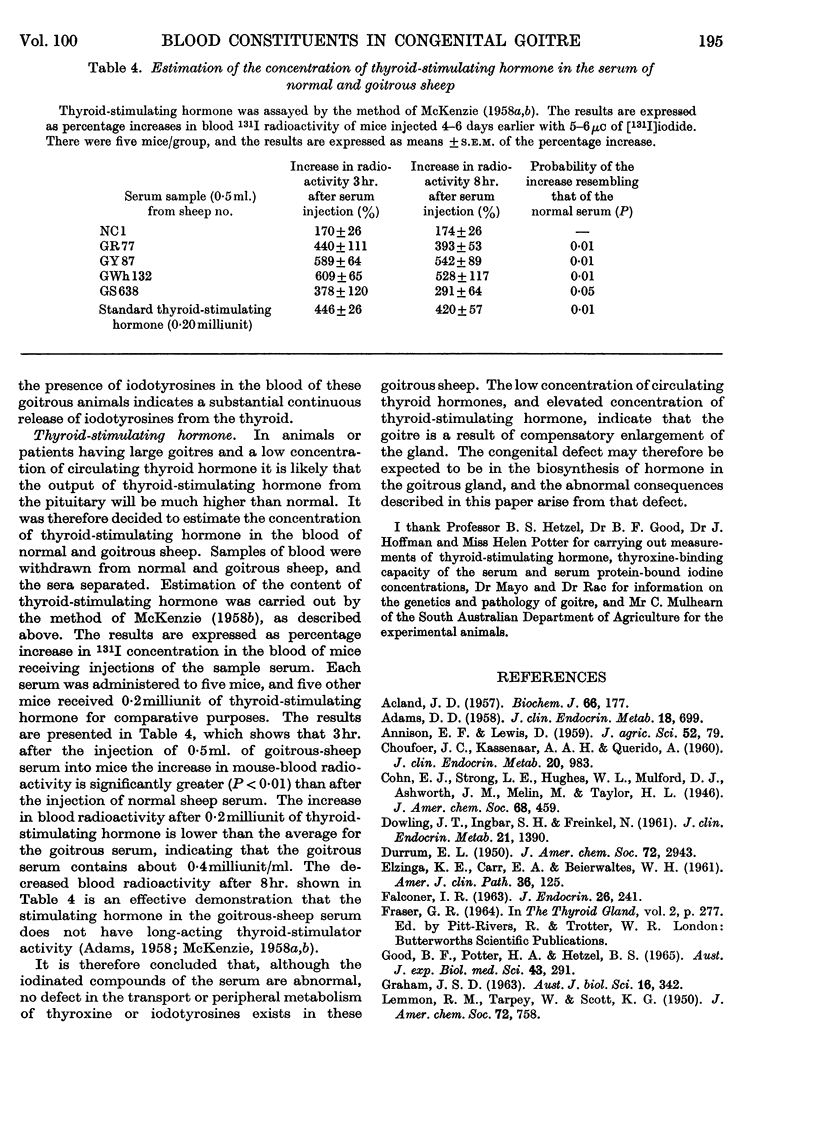
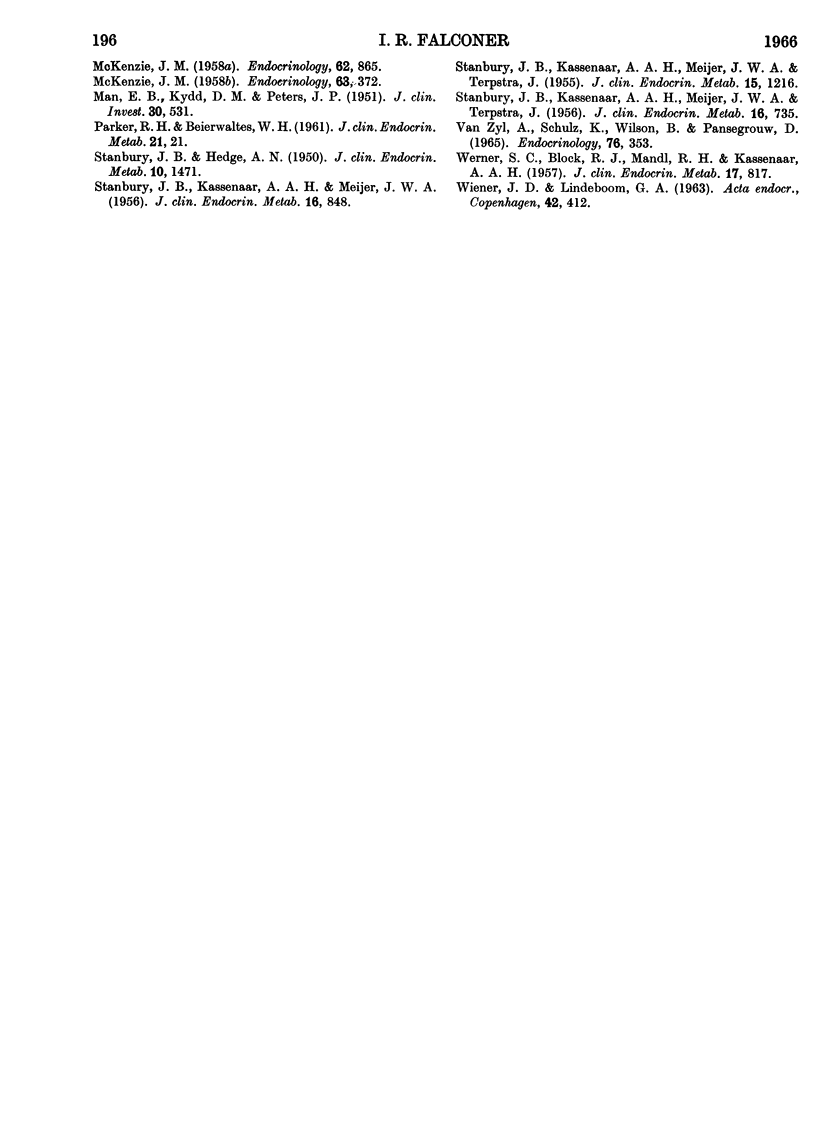
Images in this article
Selected References
These references are in PubMed. This may not be the complete list of references from this article.
- ACLAND J. D. The estimation of serum protein-bound iodine by alkaline incineration. Biochem J. 1957 May;66(1):177–188. doi: 10.1042/bj0660177. [DOI] [PMC free article] [PubMed] [Google Scholar]
- ADAMS D. D. The presence of an abnormal thyroid-stimulating hormone in the serum of some thyrotoxic patients. J Clin Endocrinol Metab. 1958 Jul;18(7):699–712. doi: 10.1210/jcem-18-7-699. [DOI] [PubMed] [Google Scholar]
- CHOUFOER J. C., KASSENAAR A. A., QUERIDO A. The syndrome of congenital hypothyroidism with defective dehalogenation of iodotyrosines. Further observations and a discussion of the pathophysiology. J Clin Endocrinol Metab. 1960 Jul;20:983–1003. doi: 10.1210/jcem-20-7-983. [DOI] [PubMed] [Google Scholar]
- DOWLING J. T., INGBAR S. H., FREINKEL N. Abnormal iodoproteins in the blood of eumetabolic goitrous adults. J Clin Endocrinol Metab. 1961 Nov;21:1390–1401. doi: 10.1210/jcem-21-11-1390. [DOI] [PubMed] [Google Scholar]
- ELZINGA K. E., CARR E. A., Jr, BEIERWALTES W. H. Adaptation of the standard Durrum-type cell for reverse-flow paper electrophoresis. Am J Clin Pathol. 1961 Aug;36:125–131. doi: 10.1093/ajcp/36.2.125. [DOI] [PubMed] [Google Scholar]
- GOOD B. F., POTTER H. A., HETZEL B. S. THE EFFECT OF SALICYLATE AND RELATED DRUGS ON THYROXINE BINDING IN MAN. Aust J Exp Biol Med Sci. 1965 Jun;43:291–304. doi: 10.1038/icb.1965.28. [DOI] [PubMed] [Google Scholar]
- MAN E. B., KYDD D. M., PETERS J. P. Butanol-extractable iodine of serum. J Clin Invest. 1951 May;30(5):531–538. doi: 10.1172/JCI102469. [DOI] [PMC free article] [PubMed] [Google Scholar]
- McKENZIE J. M. Delayed thyroid response to serum from thyrotoxic patients. Endocrinology. 1958 Jun;62(6):865–868. doi: 10.1210/endo-62-6-865. [DOI] [PubMed] [Google Scholar]
- McKENZIE J. M. The bioassay of thyrotropin in serum. Endocrinology. 1958 Sep;63(3):372–382. doi: 10.1210/endo-63-3-372. [DOI] [PubMed] [Google Scholar]
- STANBURY J. B., HEDGE A. N. A study of a family of goitrous cretins. J Clin Endocrinol Metab. 1950 Nov;10(11):1471–1484. doi: 10.1210/jcem-10-11-1471. [DOI] [PubMed] [Google Scholar]
- STANBURY J. B., KASSENAAR A. A., MEIJER J. W., TERPSTRA J. The occurrence of mono- and di-iodotyrosine in the blood of a patient with congenital goiter. J Clin Endocrinol Metab. 1955 Oct;15(10):1216–1227. doi: 10.1210/jcem-15-10-1216. [DOI] [PubMed] [Google Scholar]
- STANBURY J. B., MEIJER J. W., KASSENAAR A. A. The metabolism of iodotyrosines. II. The metabolism of mono- and diiodotyrosine in certain patients with familial goiter. J Clin Endocrinol Metab. 1956 Jul;16(7):848–868. doi: 10.1210/jcem-16-7-848. [DOI] [PubMed] [Google Scholar]
- VANZYL A., SCHULZ K., WILSON B., PANSEGROUW D. THYROIDAL IODINE AND ENZYMATIC DEFECTS IN CATTLE WITH CONGENITAL GOITER. Endocrinology. 1965 Mar;76:353–361. doi: 10.1210/endo-76-3-353. [DOI] [PubMed] [Google Scholar]
- WERNER S. C., BLOCK R. J., MANDL R. H., KASSENAAR A. A. Pathogenesis of a case of congenital goiter with abnormally high levels of SPI and with mono- and diiodotyrosine in the serum. J Clin Endocrinol Metab. 1957 Jul;17(7):817–831. doi: 10.1210/jcem-17-7-817. [DOI] [PubMed] [Google Scholar]
- WIENER J. D., LINDEBOOM G. A. Defective thyroid hormone biosynthesis with anomalous reaction to thyroid therapy. Report of a case. Acta Endocrinol (Copenh) 1963 Mar;42:412–422. doi: 10.1530/acta.0.0420412. [DOI] [PubMed] [Google Scholar]



